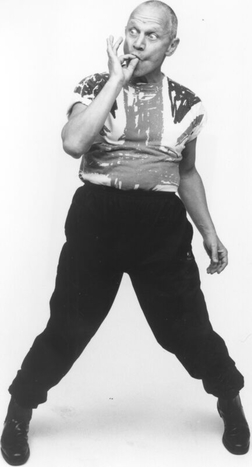
One man, two plays, and three distinct characters. This was the formula that made Steven Berkoff’s play “One Man” outrageous and memorable when it played the LPAC on Saturday, 30th January.
Beginning in pitch black with “The Tell-tale Heart”, Berkoff appeared beneath the spotlight with a white face and red lips. Dressed in a tuxedo, he began to tell the macabre story of murder that is essentially a study of obsession.
The unnamed character immediately asks “I suppose you think I’m mad?”, which created a sense of involvement with the audience but also made them question the character’s mental state throughout. If a person can address, and seem to comprehend their madness, are they really mad?
Berkoff’s physical theatre and ability to captivate the audience was outstanding, and it was phenomenal to watch him paint the empty set with his body as well as he did. He made the murder so visually clear, through eloquent storytelling and gestures, that the blank set did not seem bare but was in fact filled with emotive splendour.
What was odd about this piece was how funny it was. It seemed that, in order to widen the appeal, the comedic sections were emphasised. This in turn weakened the dark truths that the play confronts.
The comedy was perhaps a little too much at times and made it feel like a parody rather than a serious interpretation. However, Berkoff’s physical ability at age 72 is astonishing, not ignoring his melodious speech exposed the play’s true meanings.
After the murder has been committed, the police visit the protagonist after hearing a scream, and the audience witness a man who is confident about his cover-up story change into someone wracked with guilt.
The character goes on to admit the crime. This comes after he hears the heartbeat of his victim under the floor — a manifestation of his mind. Berkoff spent a lot of time with this scene, emphasising how the imagination can take control of one’s feelings and, ultimately, actions.
This theme that can relate to any individual. It shows the consequences of emotional suppression and how that can be internally destructive.
In contrast, the second act saw Berkoff play a football- and alcohol-loving yob and his pitbull terrier, Roy, in the self-penned and savage tale, “Dog”.
Derived from a period of reading news stories of dogs mauling children, Berkoff again presented the audience with an extremely serious theme marked with black humour.
As an old man adopting a cockney accent and wearing punk clothing, Berkoff proved himself to be quite the stand-up comic as he parodied the senseless actions of the character, such as him drinking 35 pints of beer, vomiting across the pavement, yet still seeing that as a victory.
It was astonishing to watch him as he fearlessly alternated between playing the human and playing the dog. It seemed as though the pitbull was an extension of the man and represented his animalistic and slavering characteristics that were impossible for him to express.
For what was perhaps the more compelling piece, Berkoff not only addressed the issue of how dangerous dogs can be when left unattended, but also to the lifestyle that football hooliganism and binge-drinking may lead to.
It was difficult to see how Berkoff could top “Shakespeare’s Villains” — his last performance at the LPAC — with “One Man”, but through versatility and wonderful characterisation, he certainly matched it.
